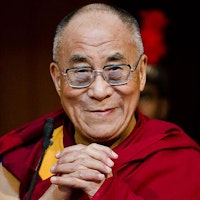Education is universal. We must teach people, especially our youth, the source of happiness and satisfaction. We must teach them that the ultimate source of happiness is within themselves. Love, kindness, and affection are the source of joy and happiness….
The Dalai Lama

Education Is Universal
Topic: Education & Character
“Religion is not sufficient… Education is universal. We must teach people, especially our youth, the source of happiness and satisfaction. We must teach them that the ultimate source of happiness is within themselves. Not machine. Not technology. Not money. Not power.
We’re not talking about heaven or hell or Buddhahood or salvation; these are too far away.” He laughed. “So our book is part of this important process to help spread the message that love, kindness, and affection are the source of joy and happiness. As you [Desmond Tutu] already made clear, our basic human nature is good, is positive, so that can give us a basis for courage and self-confidence.“
Tenzin Gyatso, born on July 6, 1935, is known globally as the 14th Dalai Lama, the spiritual and former political leader of the Tibetan people. Born as Lhamo Thondup in a farming family in Taktser, Amdo, Tibet, he was recognized as the reincarnation of the 13th Dalai Lama, Thubten Gyatso, when he was just two years old. As the Dalai Lama, he holds the highest spiritual position within Tibetan Buddhism and is seen as a figure of great moral authority and influence. Following China's invasion of Tibet in 1950, he assumed full political power in 1950 but was forced into exile in India in 1959 after the failed Tibetan uprising against Chinese rule.
The Dalai Lama is renowned for his messages of peace, non-violence, inter-religious understanding, and compassion. He has authored numerous books and has lectured worldwide, becoming one of the most influential figures in the world of spirituality and philosophy. In recognition of his work for peace and non-violence, he was awarded the Nobel Peace Prize in 1989. Furthermore, his advocacy for the cultural and religious rights of the Tibetan people and his efforts to find a peaceful solution to the situation in Tibet through dialogue and understanding, rather than violence, have made him an internationally respected leader. Despite the political controversies and challenges, he remains committed to promoting human values and harmony among the world's religious traditions.
The Book of Joy
Abrams, Douglas. "The Book of Joy: Lasting Happiness in a Changing World" [Dalai Lama XIV, Desmond Tutu, with Douglas Carlton Abrams (October 18th 2016 by Avery)] pp. 273-274.

The Dalai Lama
Copyright © 2017 – 2024 LuminaryQuotes.com About Us

The Book of Joy [excerpt]
Here is more from The Book of Joy where in the final segment of their dialogue, Departure: A Final Goodbye, the Dalai Lama is responding to Archbishop Tutu and their interlocutor Douglas Abrams:
“After meeting with so many people, thinkers, scientists, educators, health-care professionals, social workers and activists, it is clear that the only way to truly change our world is through teaching compassion. Our society is lacking an adequate sense of compassion, sense of kindness, and genuine regard for others’ well-being. So now many, many, people who seriously think about humanity all have the same view. We must promote basic human values, the inner values that lie at the heart of who we are as humans.
Religion is not sufficient. Religion has been very important in human history, and perhaps for another thousand years it will continue to bring benefit to humanity. So now we have to think seriously. Just to pray or rely on religious faith is not sufficient. It will remain a source of inspiration, but in terms of seven billion human beings, it’s not sufficient. No matter how excellent, no religion can be universal. So we have to find another way to promote these values.
I think the only way really is, as we have said, through education. Education is universal. We must teach people, especially our youth, the source of happiness and satisfaction. We must teach them that the ultimate source of happiness is within themselves. Not machine. Not technology. Not money. Not power.
We’re not talking about heaven or hell or Buddhahood or salvation; these are too far away.” He laughed. “So our book is part of this important process to help spread the message that love, kindness, and affection are the source of joy and happiness. As you [Desmond Tutu] already made clear, our basic human nature is good, is positive, so that can give us a basis for courage and self-confidence. So that’s why we spend a lot of time discussing all of this. There must be some real, concrete purpose and result, or if not, it’s better to sleep.” The Dalai Lama leaned over and pretended to lean over on his elbow toward the Archbishop, as if falling asleep, and then laughed.”
–Dalai Lama XIV, Desmond Tutu, with Douglas Carlton Abrams [“The Book of Joy: Lasting Happiness in a Changing World”] pp. 273-274.